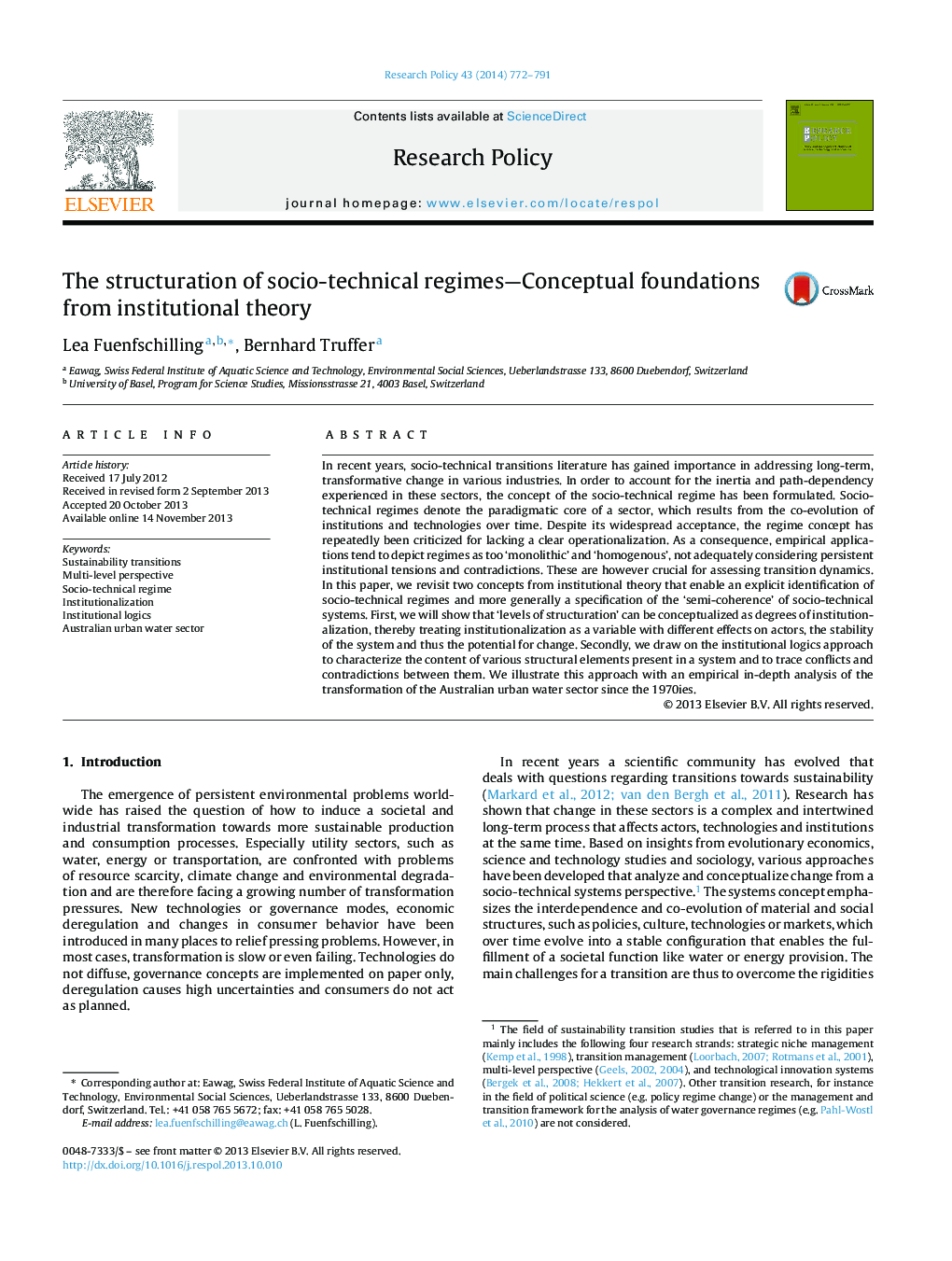| کد مقاله | کد نشریه | سال انتشار | مقاله انگلیسی | نسخه تمام متن |
|---|---|---|---|---|
| 10483040 | 934326 | 2014 | 20 صفحه PDF | دانلود رایگان |
عنوان انگلیسی مقاله ISI
The structuration of socio-technical regimes-Conceptual foundations from institutional theory
ترجمه فارسی عنوان
ساختار رژیم های اجتماعی - فنی - مبانی مفهومی از نظریه نهادی
دانلود مقاله + سفارش ترجمه
دانلود مقاله ISI انگلیسی
رایگان برای ایرانیان
کلمات کلیدی
انتقال پایدار، چشم انداز چند مرحله ای، رژیم اجتماعی و فنی، سازماندهی نشده، منطق سازمانی، بخش آب شهری استرالیا،
ترجمه چکیده
در سال های اخیر، ادبیات انتقال اجتماعی-فنی به اهمیت تبدیل شدن به تغییرات درازمدت و تحول در صنایع مختلف تبدیل شده است. به منظور در نظر گرفتن اینرسی و وابستگی مسیری که در این بخش ها تجربه شده است، مفهوم رژیم اجتماعی-فنی مطرح شده است. رژیم های اجتماعی و فنی، هسته پارادایمی یک بخش را نشان می دهند که از هماهنگی مؤسسات و فن آوری در طول زمان حاصل می شود. با وجود پذیرش وسیع آن، مفهوم رژیم به طور مکرر مورد انتقاد قرار گرفته است زیرا فاقد یک عملیات واضح است. به عنوان یک نتیجه، برنامه های تجربی تمایل دارند رژیم ها را به عنوان "یکپارچه" و "همگن" ترسیم کنند، که به تناسب تنش و تناقض های سازمانی پایدار نیستند. این ها برای ارزیابی دینامیک انتقال بسیار مهم هستند. در این مقاله، ما دو مفهوم از نظریه نهادی را بازبینی می کنیم که شناسایی صریح رژیم های اجتماعی-فنی و به طور کلی یک مشخصه «نیمه هماهنگی» سیستم های اجتماعی-فنی را امکان پذیر می سازد. اولا، ما نشان خواهیم داد که «سطوح ساختارگرایی» می تواند به عنوان درجه ای از نهادینه سازی مفهوم شود، در نتیجه، نهادینه سازی به عنوان یک متغیر با تأثیرات متفاوت بر بازیگران، ثبات سیستم و بنابراین پتانسیل تغییر می شود. ثانیا، ما رویکرد منطق نهادی را برای توصیف محتوای عناصر ساختاری مختلف موجود در یک سیستم و ردیابی منازعات و تضادهای بین آنها، روبرو می کنیم. ما این رویکرد را با تجزیه و تحلیل عمیق تجربی از تحول بخش آب شهری استرالیا از دهه 1970 نشان می دهیم.
موضوعات مرتبط
علوم انسانی و اجتماعی
مدیریت، کسب و کار و حسابداری
کسب و کار و مدیریت بین المللی
چکیده انگلیسی
In recent years, socio-technical transitions literature has gained importance in addressing long-term, transformative change in various industries. In order to account for the inertia and path-dependency experienced in these sectors, the concept of the socio-technical regime has been formulated. Socio-technical regimes denote the paradigmatic core of a sector, which results from the co-evolution of institutions and technologies over time. Despite its widespread acceptance, the regime concept has repeatedly been criticized for lacking a clear operationalization. As a consequence, empirical applications tend to depict regimes as too 'monolithic' and 'homogenous', not adequately considering persistent institutional tensions and contradictions. These are however crucial for assessing transition dynamics. In this paper, we revisit two concepts from institutional theory that enable an explicit identification of socio-technical regimes and more generally a specification of the 'semi-coherence' of socio-technical systems. First, we will show that 'levels of structuration' can be conceptualized as degrees of institutionalization, thereby treating institutionalization as a variable with different effects on actors, the stability of the system and thus the potential for change. Secondly, we draw on the institutional logics approach to characterize the content of various structural elements present in a system and to trace conflicts and contradictions between them. We illustrate this approach with an empirical in-depth analysis of the transformation of the Australian urban water sector since the 1970ies.
ناشر
Database: Elsevier - ScienceDirect (ساینس دایرکت)
Journal: Research Policy - Volume 43, Issue 4, May 2014, Pages 772-791
Journal: Research Policy - Volume 43, Issue 4, May 2014, Pages 772-791
نویسندگان
Lea Fuenfschilling, Bernhard Truffer,
